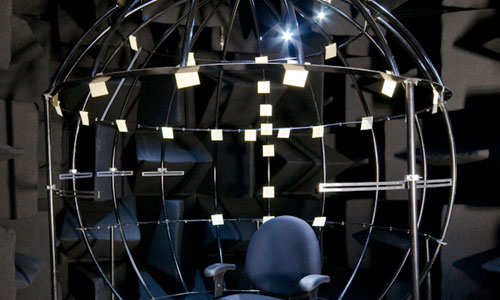Science and Music: The Mystery of Amusia by Charles-David Tremblay
/ February 1, 2015
Version française...

The hemi-anechoic chamber at BRAMS.
The field of music cognition is rapidly developing, thanks particularly to discoveries concerning amusia. People with amusia have difficulty recognizing music.
Two forms of amusia have been studied: the inability to discern notes with different pitches and the inability to recognize rhythms.
“Most people with no musical instruction are able to discern two adjacent notes on the piano, whereas people with amusia cannot,” auditory neuroscience specialist Benjamin Zendel states. Similarly, they cannot synchronize their movements to music.
At the International Laboratory for Brain, Music, and Sound Research (BRAMS), several researchers, including Zendel, are working on these issues as well as on various research topics linked to music. Located in Montreal and affiliated with both the Université de Montréal and McGill University, BRAMS is a research centre internationally recognized for its work on music cognition.
“Research carried out at BRAMS is some of the best in the world and offers researchers unique opportunities for collaboration and discussion,” Benjamin Zendel asserts. Since its establishment in 2003, BRAMS has been the place where the best researchers in the field meet and where significant discoveries pertaining to music can be achieved.
Thanks to his research focused on music and aging at BRAMS, Zendel sets forth the benefits of music training. In his articles, he points out that such training can slow down auditory losses related to age. “Being a musician affects seniors’ cognition,” says Zendel. “Furthermore, music memory seems to be one of the last ones affected by dementia.”
Understanding the interplay between music and aging is therefore vital for facilitating the rehabilitation of seniors with various forms of dementia, or to slow down their onset.
In addition, BRAMS conducts research on a variety of other topics. There has been an increasing number of endeavours aimed at showing that music training improves auditory abilities in children as well as in adults. Music contributes to brain development, whether for language or mathematics.
“Music lessons are useful because they involve several aspects of cognition (e.g. hearing, vision - reading music scores, motor coordination, memory - long and short term, attention, proprioception, etc.) and therefore can potentially improve a number of cognitive abilities,” Zendel explains.
Research is also underway on the link between music and emotions: investigating the relationship between musical structures, neuronal reactions and the way in which music can influence thought and feelings. Lastly, studies of the synchronization of motion with rhythm lead to studying muscle coordination during a musical presentation as well as music’s effect on motor development. The aim of this research is to improve musicians’ playing and to make it easier for those who want to learn music.
To be able to conduct these research projects, BRAMS has state-of-the-art technology and equipment. “All the necessary infrastructure to study music cognition is here. As a researcher, everything I need to do my work is available.”
There are ten soundproof rooms. One of these is a hemi-anechoic chamber, made of sound wave absorbent walls, thus producing an environment free of electromagnetic waves. This provides the advantage of being free of echoes which could lead to disturbances in the measurements and, therefore, ensuring the quality of the results obtained. As well, five EEG (electroencephalography) systems register the brain’s electrical activity in response to sound stimuli.
Here and in other areas around the world, research laboratories such as BRAMS help advance knowledge, whether related to problems such as amusia or others. Although major discoveries have been made, auditory neuroscience is in its infancy. The coming years will be decisive for this developing field since many questions remain regarding the link between music and the human brain.
Translation: Karine Poznanski
Version française... | 
